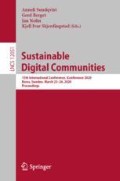Abstract
This study aims to gain a better understanding of a global collective process of trolling Donald Trump’s inauguration speech. One hundred videos with satirical trolling content were posted over a three-weeks period in 2017. We performed thematic content analysis of sixty videos, each represents a different country to understand the role of national culture and crowd work in global trolling. Results show that all the videos involve satirical trolling behaviors, regardless of national boundaries, and that we found that similar to prior research on collective intelligence, processes of innovation, replication, and customization were evident.
Access this chapter
Tax calculation will be finalised at checkout
Purchases are for personal use only
References
Buckles, E.E., Trapnell, P.D., Paulhus, D.L.: Trolls just want to have fun. Pers. Individ. Differ. 67, 97–102 (2014)
Ferrari, E.: Fake accounts, real activism: political faking and user-generated satire as activist intervention. New Media Soc. 20(6), 2208–2223 (2018)
Fichman, P., Dainas, A.: Graphicons and tactics in satirical trolling on Tumblr.com. Int. J. Commun. 13, 4261–4286 (2019)
Fichman, P., Peters, E.: The impacts of territorial communication norms and composition on online trolling. Int. J. Commun. 13, 1016–1035 (2019)
Fichman, P., Sanfilippo, M.R.: Online Trolling and Its Perpetrators: Under the Cyberbridge. Rowman & Littlefield, Lanham (2016)
Flores-Saviaga, C., Keegan, B.C., Savage, S.: Mobilizing the Trump train: understanding collective action in a political trolling community (2018). https://arxiv.org/pdf/1806.00429.pdf
Giles, J.: Internet encyclopedias go head to head. Nature 438, 900–901 (2005)
Gudykunst, W.B.: Bridging Differences: Effective Intergroup Communication, 3rd edn. Sage Publications, Thousand Oaks (1998)
Gudykunst, W.B., Ting-Toomey, S.: Verbal communication styles. In: Gudygunst, W.B., Ting-Toomey, S., Chua, E. (eds.) Culture and Intercultural Communication, pp. 99–117. Sage Publications, Newbury Park (1988)
Hofstede, G., Hofstede, G.J., Minkov, M.: Cultures and Organizations: Software of the Mind, 3rd edn. McGraw-Hill, New York (2010)
Kyriakou, H., Nickerson, J.V., Sabnis, G.: Knowledge reuse for customization: metamodels in an open design community for 3D printing. MIS Q. 41(1), 315–332 (2017)
Lévy, P.: Collective Intelligence: Mankind’s Emerging World in Cyberspace. Perseus Books Group, Cambridge (1997). Transl. by R. Bononno
Lu, J.G., Martin, A.E., Usova, A., Galinsky, A.D.: Creativity and humor across cultures: where Aha meet Haha (2019). https://doi.org/10.1016/B978-0-12-813802-1.00009-0
Miles, M.B., Huberman, A.M.: Qualitative Data Analysis: An Expanded Sourcebook, 2nd edn. Sage Publications, Thousand Oaks (1994)
McCosker, A.: Trolling as provocation: YouTube’s agonistic publics. Converg. Int. J. Res. New Media Technol. 20(2), 201–217 (2014)
Nickerson, J.V., Yu, L.: Cooks or cobblers? Crowd creativity through combination. In: Proceeding of CHI, pp. 1393–1402 (2011)
Nyst, C., Monaco, H.: State-sponsored trolling. Institute for the Future (2018). https://docs.google.com/viewer?url=http%3A%2F%2Fwww.iftf.org%2Ffileadmin%2Fuser_upload%2Fimages%2FDigIntel%2FIFTF_State_sponsored_trolling_report.pdf
Sanfilippo, M.R., Yang, S., Fichman, P.: Trolling here, there, and everywhere: perceptions of trolling behaviors in context. J. Assoc. Inf. Sci. Technol. 68(10), 2313–2327 (2017)
Sanfilippo, M.R., Fichman, P., Yang, S.: Multidimensionality of online trolling behaviors. Inf. Soc. 34(1), 1–13 (2018)
Shachaf, P., Hara, N.: Beyond vandalism: Wikipedia trolls. J. Inf. Sci. 36(3), 357–370 (2010)
Sun, H., Fichman, P.: Chinese collective trolling. In: Proceedings of 81st Annual Meeting of the Association for Information Science and Technology, pp. 478–485 (2018)
Surowiecki, J.: The Wisdom of the Crowds. Anchor Books, New York (2004)
Synnott, J., Coulias, A., Ioannou, M.: Online trolling: the case of Madeleine McCann. Comput. Hum. Behav. 71, 70–78 (2017)
Tapscott, D., Williams, A.D.: Wikinomics: How Mass Collaboration Changes Everything. Penguin Group Inc., New York (2007)
Viegas, F.B., Wattenberg, M., Kriss, J., van Ham, F.: Talk before you type: coordination in Wikipedia. In: Proceedings of the 40th Annual Hawaii International Conference on System Sciences, pp. 575–582 (2007)
Wang, K., Nickerson, J.V., Sakamoto, Y.: Crowdsourced idea generation: the effect of exposure to an original idea. Creat. Innov. Manag. 27(2), 196–208 (2018)
Zelenkauskaite, A., Niezgoda, B.: “Stop Kremlin trolls:” ideological trolling as calling out, rebuttal, and reactions on online news portal commenting. First Monday (2017). https://doi.org/10.5210/fm.v22i5.7795
Author information
Authors and Affiliations
Corresponding author
Editor information
Editors and Affiliations
Rights and permissions
Copyright information
© 2020 Springer Nature Switzerland AG
About this paper
Cite this paper
Fichman, P. (2020). Trolling Trump. In: Sundqvist, A., Berget, G., Nolin, J., Skjerdingstad, K. (eds) Sustainable Digital Communities. iConference 2020. Lecture Notes in Computer Science(), vol 12051. Springer, Cham. https://doi.org/10.1007/978-3-030-43687-2_10
Download citation
DOI: https://doi.org/10.1007/978-3-030-43687-2_10
Published:
Publisher Name: Springer, Cham
Print ISBN: 978-3-030-43686-5
Online ISBN: 978-3-030-43687-2
eBook Packages: Computer ScienceComputer Science (R0)

